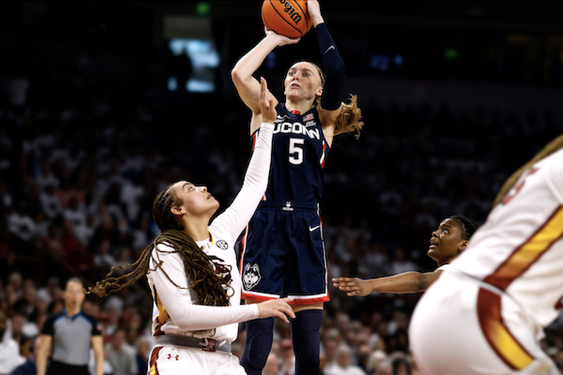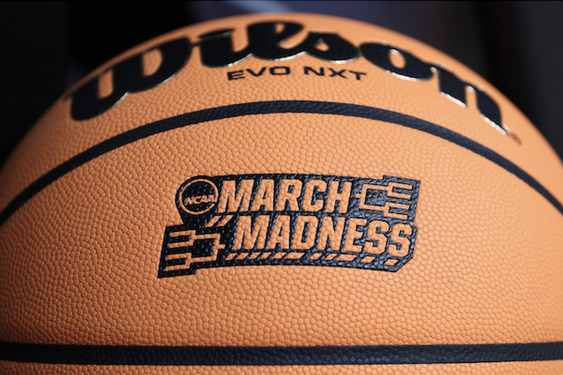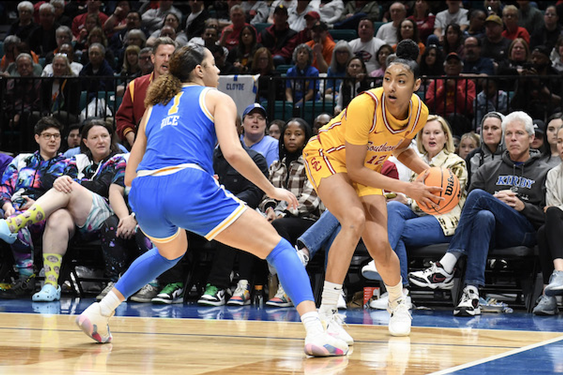Of all Zion Williamson’s memorable feats throughout the past several months — the dunks, the blocked shots, the highly-disseminated destruction of a particular piece of Nike footwear — perhaps the most significant happened at the ACC tournament: through his mere presence, Williamson energized the Thursday late game, and made it appointment viewing.
Such a thing is no small task. Most years, the Thursday late game, the tournament’s final quarterfinal, looks and feels anticlimactic. It always begins around 9:30 p.m., after a long and full day of basketball, and more often than not it plays out before thousands of empty seats.
The best finish of the 2011 ACC tournament came in that same game in the same round, when Virginia Tech and Florida State dragged on late into the night before Derwin Kitchen’s buzzer-beater for the Seminoles was waved off after a replay review. The announced attendance that night was more than 23,000, and perhaps one-tenth of it remained for the end of the Hokies’ victory. Seated on the baseline, even ACC Commissioner John Swofford looked a little dazed in the second half, and he was far from alone.
That’s how the final second-round and quarterfinal games usually are: tired crowds, empty seats, resting eyes. Which leads to Thursday, which was none of that. Williamson, the Duke freshman, was playing in his first game since Feb. 20, and the blown-shoe-heard-round-the-world.
Duke’s eventual victory over Syracuse at the end of a long day became the main event instead of the afterthought, with the usual — meaning completely unusual, for a college basketball player — amount of attention on Williamson from the moment he left the locker room, to the court and back again, where a fleet of cameras and microphones awaited.
Asked recently if he could recall witnessing another player receive the kind of attention that Williamson has, Swofford, who has been the ACC’s commissioner since 1997, offered simple insight: “No, I haven’t,” he said.
“He’s a very unique player,” he said. “We’re in a social-media time that is relatively new. When you combine those two things, you get Zion.
Williamson is, at once, both a freshman college basketball player who is going through the kind of growth — mental and emotional, especially — that many college freshman experience; and yet he is also a national phenomenon: a spectacle whose fame has made his last name somewhat obsolete. Indeed, Williamson these days is simply “Zion,” and living life as Zion means living in the fishbowl — every eye and iPhone focused on him.
———
This was especially true at the ACC tournament, where Williamson returned after missing all of Duke’s previous five games. He missed all but seconds of a sixth after — in a moment of sporting infamy — his left foot tore through his Nike sneaker in the first minute of Duke’s first game against North Carolina, a UNC victory at Cameron Indoor Stadium on Feb. 20.
In the weeks since, the Legend of Zion only grew, even in his absence. His injury, a right knee sprain, dominated the national college basketball conversation as much as his play had during the previous months. The question of whether he’d return or whether he should sit out the remainder of the season in an act of self-preservation became a story in itself — even if to Williamson it was never much of a question at all.
“Man, can’t do that to my teammates,” he said on Friday night, dismissing another question about why he didn’t shut himself down for the season. “I made a commitment to my brothers when I first went to Duke. And what people don’t see on camera is you go through a lot during the summer and through these practices. …
“You just can’t turn your back on them, because of the injuries.”
Indeed, Williamson’s return meant the return of college basketball’s greatest force. His impact on the court has become clear enough in part through the viral highlights — the stunning display of athleticism he often unleashes, especially on plays around the rim — but quantifying the Williamson Effect off the court is more difficult. In an age of social media and round-the-clock sports coverage he has, arguably, become the focal point of more hype than anyone in college basketball history.
Everyone, it seems, wants to sell Williamson: ESPN, whose personalities spend no shortage of time talking about him; Nike, who sent representatives to Durham to speak with Williamson and Duke coach Mike Krzyzewski the day after Williamson’s shoe fell apart; the media members who write stories about him and post video clips of him; and, of course, Duke and the greater college basketball business enterprise. Even the ticket scalpers at the ACC tournament were hoping for a pay day.
Outside the Spectrum Center on Thursday night, before the night session, a scalper named Jerry Siler — he wore a gold chain with a “Ticket Jerry” medallion hanging from it — was hoping that Williamson’s return would translate to lucrative business. In perhaps something of a surprise, though, Siler found himself disappointed in the market: “This has been the worst one ever,” he said of tournament demand. People weren’t buying many tickets but, for a change, many weren’t selling them, either.
———
While Siler and other scalpers might’ve hoped for more of an economic impact from Williamson, ESPN certainly can’t complain. The network over the past week has twice promoted the high ratings it has received for games involving Duke. The ACC tournament semifinal between Duke and UNC on Friday night, for one, became the network’s highest-rated “championship week” game in history.
During the regular season, meanwhile, four of ESPN’s five highest-rated games included Duke. According to the network, its ratings for Duke games grew by 30 percent from last year. Williamson’s presence has meant big business for television and, undoubtedly, that will continue as long as Duke remains in the NCAA Tournament. He is the sport’s greatest marketing force, one capable of generating millions for others while he remains — at least for a few more months — unable to profit the sizable enterprise he has created.
David Berri, an economist at Southern Utah University who studies the monetary value of star college basketball players, estimates that Williamson’s on-court value is approximately $2.5 million. He reached that figure through a formula that analyzed Duke’s overall men’s basketball revenue and the degree to which various players contribute to victories. Berri’s analysis, though, doesn’t include all that Williamson might be worth off the court — his value to ESPN, for instance, or even to Nike, despite the fact that one if its shoes recently failed to contain Williamson’s foot when he attempted a spin move.
“That’s a hard thing to untangle,” Berri said of Williamson’s overall worth. “The value of the (school’s) brand is a culmination of everything players have done in the past. … And that carries over into the future. So there’s this sort of residual effect. Having Christian Laettner benefited Duke beyond the time that Christian Laettner was there. And the same thing will be true of Williamson.”
Williamson could become a multi-millionaire, thanks to a potential endorsement deal, the moment he decides to forgo his collegiate eligibility, and that could happen, in theory, not long after Duke’s final game of the season — whether that’s at the Final Four in Minneapolis in early April or in the weeks before. Regardless, he’ll have to wait about three months to hear his name called in the NBA draft.
———
Williamson, though, has said that he is trying to live in the moment, which is part of the reason why he decided to continue playing after the injury: He didn’t want to give up thriving on the stage he’s created for himself. Mike Buckmire, his friend and teammate, sensed something was different about this particular Duke team back in the summer, when it traveled to Canada. Duke always performs under the glare the spotlight but Buckmire, a sophomore, noticed how people reacted to the sight of Williamson in particular.
“Canada’s really not that far,” Buckmire said, “but going to another country and seeing the attention and seeing the love and support that people gave, that was special. And last year there definitely was a lot of support and love, but also hate last year — everybody wanted to see us lose. This year, wherever we’ve gone, it’s all been kind of support and excitement of we’re going to see these guys play.”
Indeed, Duke basketball has become a show and, like a lot of popular acts, it’s a show whose star has become known by only his first name. That’s in part because Williamson could be on his way to transcending his sport the way other athletes known only by their first names have transcended theirs — Tiger, LeBron — but also because of the sound of the name, and its meaning: Zion. The holy land. In a biblical sense, Zion refers to an ancient hill in Jerusalem. Now, in a basketball sense, Zion refers to a 6-foot-7, 285-pound specimen who does things few people at his size have ever done on a court.
If he were Bob or Billy, perhaps the dunks and everything else might not seem so mythical. But he is Zion, and the name has undoubtedly helped fuel the legend and the construct that now surrounds him.
“He handles it well,” Alex O’Connell, one of Williamson’s teammates, said the night after the victory against Syracuse. “And I don’t even know if celebrity’s the right word at this point. … And we try to keep him down, too. There’s some people who are a little pushy, and we have his back, because we’re his teammates.”
Williamson understands that he has not only become part of the show, but the show itself — the main attraction wherever Duke goes. After he scored 31 points during a thrilling one-point victory against UNC in the tournament semifinals on Friday night — and after another one of those breakaway dunks that was being replayed over and over on Twitter timelines around the country — Williamson offered a brief impersonation of the media members there to chronicle him.
The day before, after the victory against Syracuse, Buckmire tried to put into perspective what this ride has been like, whether he and his teammates have embraced the spectacle or whether they’ve grown tired of it — the way fans of rival schools long ago grew tired of the constant mentions of Williamson’s name.
Buckmire, who has aspirations of becoming a doctor, noted the rarity of this experience, and argued that it’s one that should be savored.
“We definitely want to enjoy this,” he said, while reporters asked some of his other teammates in the locker room more questions about Williamson, who didn’t miss any of his 13 attempts from the field in his first game back. “It’s a special group of guys. And no matter what happens at the end of this, eventually, we’re never going to have the same team again. … But no, I don’t think — we don’t really think (the hype) is too much at all.
———
Williamson, for his part, hasn’t shied away from it, either. He plays under a spotlight that’s so powerful that others might crumble beneath it. In his first two games after his absence, though, he scored a combined 60 points and looked as though he hadn’t missed any time at all. Then he answered, again and again, the same familiar questions: ones about the shoe that he victimized, and others about what it was like to be back, and yet others about what it was like to play a full game against UNC.
Toward the end of his session on Friday night — a Duke official stood guard watching the clock — Williamson received a different kind of question. A reporter asked if he ever takes a moment to take this all in, everything around him, and whether he the spectacle surrounding him ever causes him to pause to process it.
At first, Williamson said, he didn’t give it much thought. But then, not long after arriving on campus, he noticed how people reacted to the sight of him. He had yet to play a college game, and yet the anticipation was building. On campus and around Durham, Williamson said in a matter of fact way, “there was no going out and sitting, even with my family, and not getting bothered by people.”
And that was before the media swirl had even really started.
“Going to the gas station, I go in there (and) I’m going to at least be in there 10 minutes because somebody wants to have a conversation,” Williamson said. “I mean, I can’t even go to the bathroom sometimes without people bothering me.
“But yeah, I did take a look at myself in the mirror and said, this is the life I wanted to be a part of. My parents told me all this would happen, so it’s not much of a shock, but when it happens you’re like, you’ve got to take a step back and you go, wow — I guess I’m on it.”
Someone tried to continue the conversation, to ask another question, but the Duke official standing near by had been keeping time, and time was up: “We’re done,” he said. “We’re done, guys — we’re done.”
Williamson was done for the night. Zion is still just getting started.
———
©2019 The News & Observer (Raleigh, N.C.)
Visit The News & Observer (Raleigh, N.C.) at www.newsobserver.com
Distributed by Tribune Content Agency, LLC.












